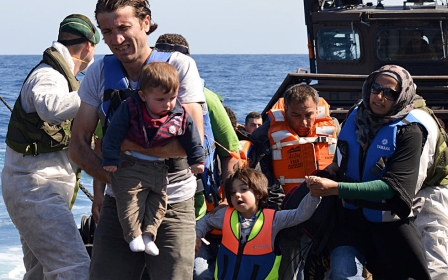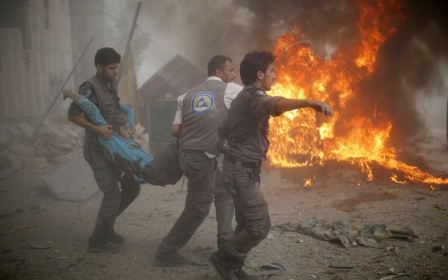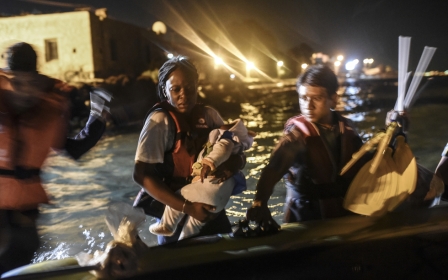What’s asylum got to do with it?

A blog by Al Jazeera online editor Barry Malone published on the Al Jazeera English website on 20 August sparked a debate on the language used when referring to people crossing the Mediterranean.
Malone defends the decision of the director of news at Al Jazeera English, Salah Negm, to no longer use the word “migrant” in this context, and to replace it with the term “refugee”. Malone claims it is done for reasons of accuracy; it is also Al Jazeera’s attempt at giving back some “voice” to those who cross the borders.
In summary, the discussion concerns the political representation of people on the move. Whilst good-willed, this shift is neither legally correct nor helpful in the battle for the right to asylum.
Labels do not exist in a vacuum: they are malleable and reflect the current political climate as well as political hierarchies of people who leave countries of their birth in order to live somewhere else. Furthermore, language tries to simplify complex political realities and social categories.
An article by Barry Malone has been very well received on why Al Jazeera has dropped the word "migrant" for "refugee," and many people are now calling for other media outlets to follow Al Jazeera's example.
The terminology suggested by Al Jazeera is, however, not accurate and may actually dilute and thus undermine the notion of a “refugee,” consequently not helping the cause at all. Moreover, on the contrary to Al Jazeera’s applaudable aim, reframing the debate in such a way does not give more voice to those on the move.
Nearly all people who arrive in Europe irregularly by boat or otherwise claim asylum; they are therefore “asylum seekers”. Over the past decade or so, the term has acquired a very pejorative meaning in Europe, but in fact it is a neutral legal definition that should be reclaimed in our political discourse.
The institution of asylum (from Greek asylon, meaning sanctuary, refuge) constitutes the right to be recognised as a refugee and to receive legal protection.
Al Jazeera is right in its decision to use the word “refugee” in the sense that an asylum seeker is a de facto refugee, ie someone who has left their country of origin, applied for asylum and is awaiting the recognition of status. Once it has been granted, that person becomes a refugee de jure. This is, however, a rather academic debate which is not best geared towards the language of the media.
“Pure refugees” and “pure economic migrants” are rarely found in real life as people flee both political persecution and dire economic conditions. The reality is that categories of “forced migrant” and “economic (ie voluntary) migrant” are very blurred in the so-called migration-asylum nexus, whereby extreme poverty is often grounded in political destabilisation because weak states are characterised by both human rights abuse and failed economies.
Another factor that must be taken into account is that the nature of conflicts has changed around the world since the 1990s: 90 percent of modern conflicts are internal, civilians make up 90 percent of casualties, and widespread sexual violence has become a weapon of war.
Taking into account the scale of conflicts in many parts of the world, especially “new” wars, defined as internal disputes involving militias and paramilitary groups, it is actually surprising that so few people migrate. The vast majority simply do not have the economic means to flee and remain trapped in life-threatening situations in their home countries.
Lack of clear-cut separation between those fleeing persecution and those escaping extreme poverty is exploited by European governments reluctant to provide sanctuary to desperate people. On the other hand, the mistreatment of refugees cannot be understood without taking into account the attack on all migrants through the tightening of immigration controls.
That is not to equate refugees with ordinary “voluntary” immigrants, but to acknowledge the similarities between the two (eg asylum seekers are now forced to use irregular migration strategies when entering a country where they will seek protection) and to comprehend the policies of European states that place asylum and immigration under one legislation.
As mentioned earlier, people do have multiple reasons for mobility, so bringing asylum and immigration together might ease the immigration officials’ burden. However, doing so does not serve the interests of refugees but those of the host state, whose primary function is gate-keeping.
If there were legal ways open to so-called economic migrants wishing to enter Europe, then we would have two separate systems: one for immigrants, and one for refugees. Unfortunately this is not the case.
What matters here is that refugee protection is an obligation under international law, whereas immigration policies are in the domain of a state’s discretion.
This tension reinforces a state’s tendency to treat refugees just like other migrants, for example when drafting quotas for those who will be granted entry or leave to remain, as well as deciding on the number of those who will be removed. In such a way asylum policy becomes a function of immigration policy.
But numbers, the basis of immigration policy, should not apply here: people who are fleeing persecution cannot plan their forced displacement, cannot predict the scale of human rights violations and cannot wait for sanctuary.
The other problem is that the imposition of stricter controls on migration of unskilled labour forces some people who would otherwise be economic migrants to enter Europe as asylum seekers. This, in turn, has led to restrictions on applying for asylum: currently reaching a safe country is almost impossible, which is a clear contravention of the Geneva Convention’s right to claim asylum.
As a consequence, both forced migrants and economic migrants get a very bad deal when trying to reach Europe. As we have seen with recent deaths in the Mediterranean and elsewhere, they often pay for the crossing with their lives.
- Dr Natalia Paszkiewicz is a Projects Coordinator at the IARS International Institute. Her academic background is in anthropology, refugee studies and social policy. She has been working in the field of migration for over ten years, both in the UK and in Malta.
The views expressed in this article belong to the author and do not necessarily reflect the editorial policy of Middle East Eye.
Photo: Syrian migrants board the Eleftherios Venizelos ferry to be transported to mainland Greece on 23 August, 2015 at the port of Mytilene, on Lesbos Island (AFP)
Middle East Eye propose une couverture et une analyse indépendantes et incomparables du Moyen-Orient, de l’Afrique du Nord et d’autres régions du monde. Pour en savoir plus sur la reprise de ce contenu et les frais qui s’appliquent, veuillez remplir ce formulaire [en anglais]. Pour en savoir plus sur MEE, cliquez ici [en anglais].





